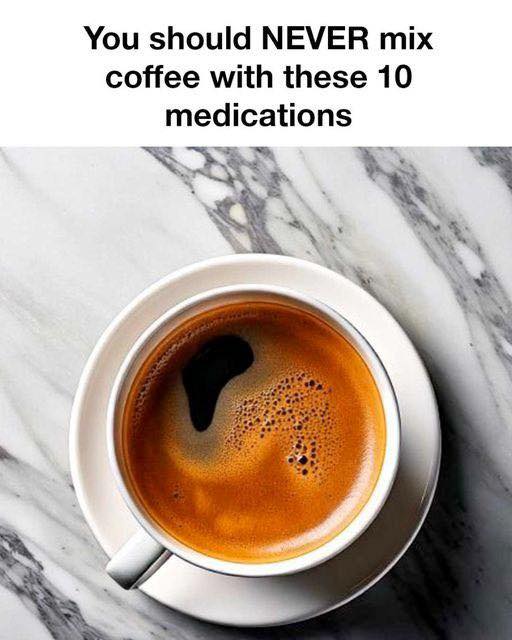ADVERTISEMENT
### **4. Thyroid Medications**
Thyroid medications, such as levothyroxine (Synthroid), are commonly prescribed to treat hypothyroidism (an underactive thyroid). These medications work by replacing or supplementing thyroid hormone levels in the body.
#### **Coffee and Thyroid Medication Absorption**
Coffee can interfere with the absorption of thyroid medications. Studies have shown that drinking coffee too soon after taking thyroid medication can significantly reduce the amount of the medication that is absorbed into the bloodstream. This could make the medication less effective in managing thyroid levels. To avoid this interaction, it’s generally recommended to wait at least 30 to 60 minutes after taking thyroid medication before drinking coffee.
### **5. Antibiotics**
Antibiotics are prescribed to treat bacterial infections, but they can also be impacted by coffee consumption. Some antibiotics, such as ciprofloxacin (Cipro) and levofloxacin (Levaquin), can interact with caffeine.
#### **Caffeine and Antibiotic Interaction**
Certain antibiotics can reduce the metabolism of caffeine, causing caffeine to stay in the bloodstream for a longer period. This can result in heightened side effects of caffeine, such as restlessness, insomnia, and jitteriness. Additionally, caffeine may interfere with the effectiveness of certain antibiotics by affecting how the body absorbs or eliminates the medication.
### **6. Diuretics**
Diuretics, also known as water pills, are commonly prescribed to treat conditions like high blood pressure, edema (fluid retention), and certain kidney problems. These medications work by increasing urine production, helping the body get rid of excess salt and water.
#### **Caffeine and Diuretics**
Caffeine is also a diuretic, which means that drinking coffee while on a diuretic medication can lead to excessive fluid loss and dehydration. This could increase the risk of electrolyte imbalances and dehydration-related complications, particularly if you’re not compensating for the additional fluid loss by drinking enough water.
## **How to Minimize the Impact of Coffee on Medications**
To minimize the potential negative effects of coffee on medications, here are a few tips you can follow:
1. **Consult with Your Doctor**: If you’re on any medication, it’s crucial to discuss your coffee consumption with your doctor. Your doctor can provide personalized advice on whether you should limit or avoid coffee and guide you on the best times to consume it relative to your medication schedule.
2. **Time Your Coffee Consumption**: In many cases, timing is everything. For instance, if you’re on thyroid medication, wait at least 30-60 minutes after taking your medication before drinking coffee. Similarly, if you’re on blood pressure medication, it may be helpful to monitor your blood pressure regularly and keep track of how coffee affects your readings.
3. **Monitor Your Symptoms**: Pay attention to any changes in your symptoms when drinking coffee while on medication. If you experience increased side effects, such as jitters, dizziness, or an upset stomach, it could be a sign that your medication and coffee are interacting negatively. Adjust your coffee intake accordingly.
4. **Stay Hydrated**: Coffee can have a dehydrating effect, so make sure to drink plenty of water throughout the day. This is especially important if you’re on medications that already affect fluid balance, such as diuretics or blood thinners.
5. **Moderate Your Intake**: It’s important to consume coffee in moderation, especially if you’re taking medications that could be affected by caffeine. Too much coffee can lead to unwanted side effects, such as increased heart rate, anxiety, or digestive issues.
## **Conclusion**
While coffee is a beloved beverage enjoyed by millions, it’s essential to recognize that it can have significant interactions with various medications. From affecting drug absorption to altering metabolism and increasing side effects, the impact of coffee on medications is complex and often overlooked. If you’re on medication, it’s vital to consider how your coffee consumption may be affecting your treatment plan and speak to your doctor for personalized guidance.
By understanding the potential interactions between coffee and medications, you can make informed decisions about your health and enjoy your daily cup of coffee while managing your medications safely.
ADVERTISEMENT
ADVERTISEMENT
